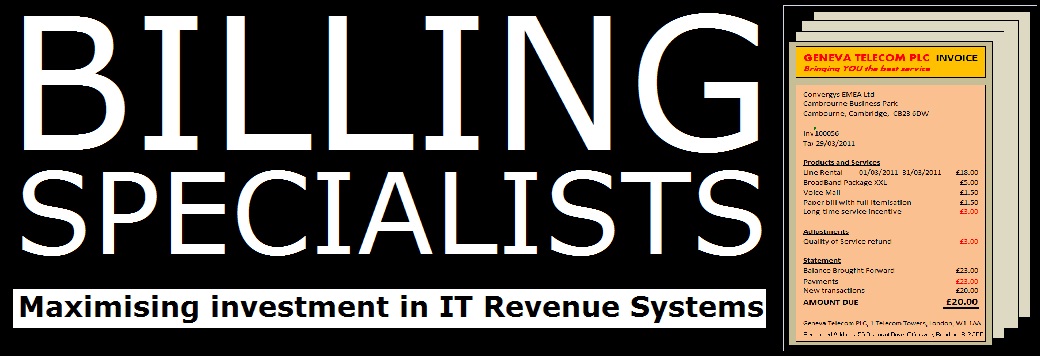|
Provisioning Mediation Rating Billing Collections Revenue Assurance Financials |

|
Installation Data Migration Upgrades Healthchecks Tuning Impact Assessments Technical Assurance |
|
Provisioning Mediation Rating Billing Collections Revenue Assurance Financials |

|
Installation Data Migration Upgrades Healthchecks Tuning Impact Assessments Technical Assurance |
As well as providing project consultancy for a specific operator, Billing Specialists has also prepared several service packages that can be delivered to operators of Rating and Billing Manager (RBM) from NetCracker.
Housekeeping activities, such as archival, deletion and good database management, are rarely considered by an operator until the application has been running for several years. Whilst disks may be cheap, slow business processes that cannot meet the demands of end customers are not!
Our consultants can provide a few days' consultancy on-site to show how RBM can be managed better to give real benefits to both the operations and business support teams.
Rating and billing is a time-critical application but we often find that operators are suffering poor performance because of the code they have integrated around RBM. One of the specialist services we offer is to examine their code and look for ways that performance can be improved.
We have helped a client to rewrite some of their Oracle PL/SQL code to benefit from new functionality that is considerably more efficient, and we speeded up the RBM Rating Engine by 10%.
The client had added an insert trigger to the RBM COSTEDEVENT table (in order to replicate the event into their Data Warehouse) but the insert was fired for every row, negating much of efficiency of the Rating Engine, which performs a single bulk array. We actually proposed to the client that they employ a plug-in that would be called by the Rating Engine to perform a single bulk insert on their bespoke table, but that exceeded their their confidence level. The didn't have skilled developers to maintain the C code. Instead we proposed a rewrite of the trigger. We made use of a new Oracle 11g feature called a Compound Trigger together with the bulk insert syntax introduced in the 1990s. The coding change took less than an hour and it halved the number of context switches between the SQL and PL/SQL Engines, which was beneficial although far less than the plug-in would have been.
The vast majority of current RBM operators started with versions dating from 2000 to 2003 (Geneva 4.0, 4,1, 4.2, 5.0 and 5.1). At the time Geneva was not mature and lacked functionality that many operators took for granted. It was therefore necessary to use workarounds to make Geneva do what is required. Many gaps were filled in more recent Geneva and RBM versions yet many operators are needlessly continuing with inefficient data structures that prevent new functionality being used.
A really good example of this is a mobile operators that started with Geneva 4.2. Their entire retail model is based on subscriptions yet that essential functionality was not introduced until Geneva 5.2. When they upgraded in 2004 they should have undertaken a simple restructuring exercise on the customer product data but chose not to. The 'do-minimum' approach for upgrades was taken, to meet the tactical need to maintain support, rather than spend a fraction more time and money to achieve other benefits at the same time. This deprived them of useful functionality, especially in the Customer Account Maintenance user interface where grouping of products within subscriptions and searches by subscription would have been possible. We advised them on some simple changes to API calls from their CRM system and we then restructured their data, which was completed using a simple overnight one-off process during their normal housekeeping window.
There are many similar opportunities to improve use of RBM that can be achieved without major investment. We can perform an analysis of an operator's database and suggest examples.
Upgrading RBM in a project lasting several months can appear to give little reward for the cost. Often operators cannot justify an upgrade solely on retaining support for the application, servers and the database. Billing Specialists can examine an operator's RBM implementation and produce a report showing the areas that would benefit from enhanced RBM functionality following an upgrade, which would then be fed into the business case.
We have performed our own analysis of all versions of RBM over the last decade (up to 7.0) and can present an overview of many new features. It will be an impartial appraisal rather than a 'sales pitch'.